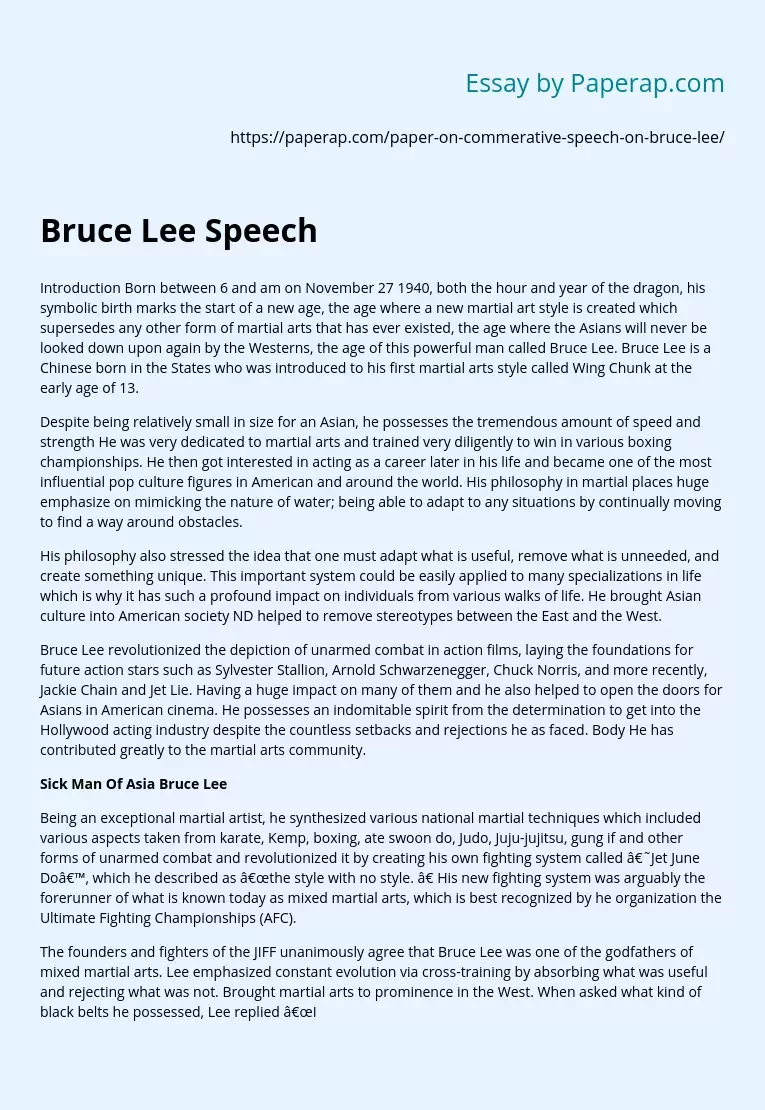Bruce Lee Speech
Introduction Born between 6 and am on November 27 1940, both the hour and year of the dragon, his symbolic birth marks the start of a new age, the age where a new martial art style is created which supersedes any other form of martial arts that has ever existed, the age where the Asians will never be looked down upon again by the Westerns, the age of this powerful man called Bruce Lee. Bruce Lee is a Chinese born in the States who was introduced to his first martial arts style called Wing Chunk at the early age of 13.
Despite being relatively small in size for an Asian, he possesses the tremendous amount of speed and strength He was very dedicated to martial arts and trained very diligently to win in various boxing championships. He then got interested in acting as a career later in his life and became one of the most influential pop culture figures in American and around the world.
His philosophy in martial places huge emphasize on mimicking the nature of water; being able to adapt to any situations by continually moving to find a way around obstacles.
His philosophy also stressed the idea that one must adapt what is useful, remove what is unneeded, and create something unique. This important system could be easily applied to many specializations in life which is why it has such a profound impact on individuals from various walks of life. He brought Asian culture into American society ND helped to remove stereotypes between the East and the West.
Bruce Lee revolutionized the depiction of unarmed combat in action films, laying the foundations for future action stars such as Sylvester Stallion, Arnold Schwarzenegger, Chuck Norris, and more recently, Jackie Chain and Jet Lie. Having a huge impact on many of them and he also helped to open the doors for Asians in American cinema. He possesses an indomitable spirit from the determination to get into the Hollywood acting industry despite the countless setbacks and rejections he as faced. Body He has contributed greatly to the martial arts community.
Sick Man Of Asia Bruce Lee
Being an exceptional martial artist, he synthesized various national martial techniques which included various aspects taken from karate, Kemp, boxing, ate swoon do, Judo, Juju-jujitsu, gung if and other forms of unarmed combat and revolutionized it by creating his own fighting system called ‘Jet June Do’, which he described as “the style with no style. ” His new fighting system was arguably the forerunner of what is known today as mixed martial arts, which is best recognized by he organization the Ultimate Fighting Championships (AFC).
The founders and fighters of the JIFF unanimously agree that Bruce Lee was one of the godfathers of mixed martial arts. Lee emphasized constant evolution via cross-training by absorbing what was useful and rejecting what was not. Brought martial arts to prominence in the West. When asked what kind of black belts he possessed, Lee replied “I don’t have any belt whatsoever. That is Just a certificate. Unless you can really do it – that is, defend yourself successfully in a fight – that belt doesn’t mean anything.
I think it might be helpful to hold your pants up, but that’s about it. ” Hence, the notion that anyone with dedication can be a master appealed to the masses and became the basis of his message. He wanted to break down Asian stereotypes through films Being an American Chinese, he wanted to change the depiction of Asian people in Western films. In all of his films, he wanted to represent a strong, masculine, and dominant Chinese-American hero that was proud of his cultural heritage and openly embraced both his American and Chinese background.
As a Chinese-American icon, Lee did more than any other actor in the period to advance the cause of racial equality for Asians living in the United States. A definitive statement from his second Hong Kong produced martial arts film, Fist of Fury (1972), that the “Chinese are no longer the sick men of Asia” reinforces one of the key messages he was seeking to promote throughout his life: that Chinese Americans were not the weak and subservient individuals that the American media stereotypically portrayed.
The racism he experienced in China, compounded with the subtle, and sometimes overt, call discrimination he felt in America, arguably convinced him that the Asians needed to be portrayed as strong individuals that could overcome the lingering stereotypes that plagued them. He emerged as an international star and eventually helped breakdown stereotypes through films to make Chinese Gung If generally accepted by Caucasians. He does not only stand on the Chinese side. Bruce Lee was one of the first Chinese Gung If teachers in the United States to teach non-Chinese.
Despite the Chinese community not allowing him to set up his own martial arts school to take in non-Chinese, he did not allow racial discrimination to affect him. He instead chose to see people as individuals and stood his ground, even though he was challenged to fight as an ultimatum to stop teaching people other than those of Chinese decent. Strong determination and the spirit of never giving up His abdominal and forearm workouts were known to be particularly intense. Because of his zealousness, Bruce Lee injured his back causing damage to his sacral nerve in 1970. The injury was due to overstraining and lifting too heavy during.
Bruce Lee Speech. (2019, Dec 05). Retrieved from https://paperap.com/paper-on-commerative-speech-on-bruce-lee/

